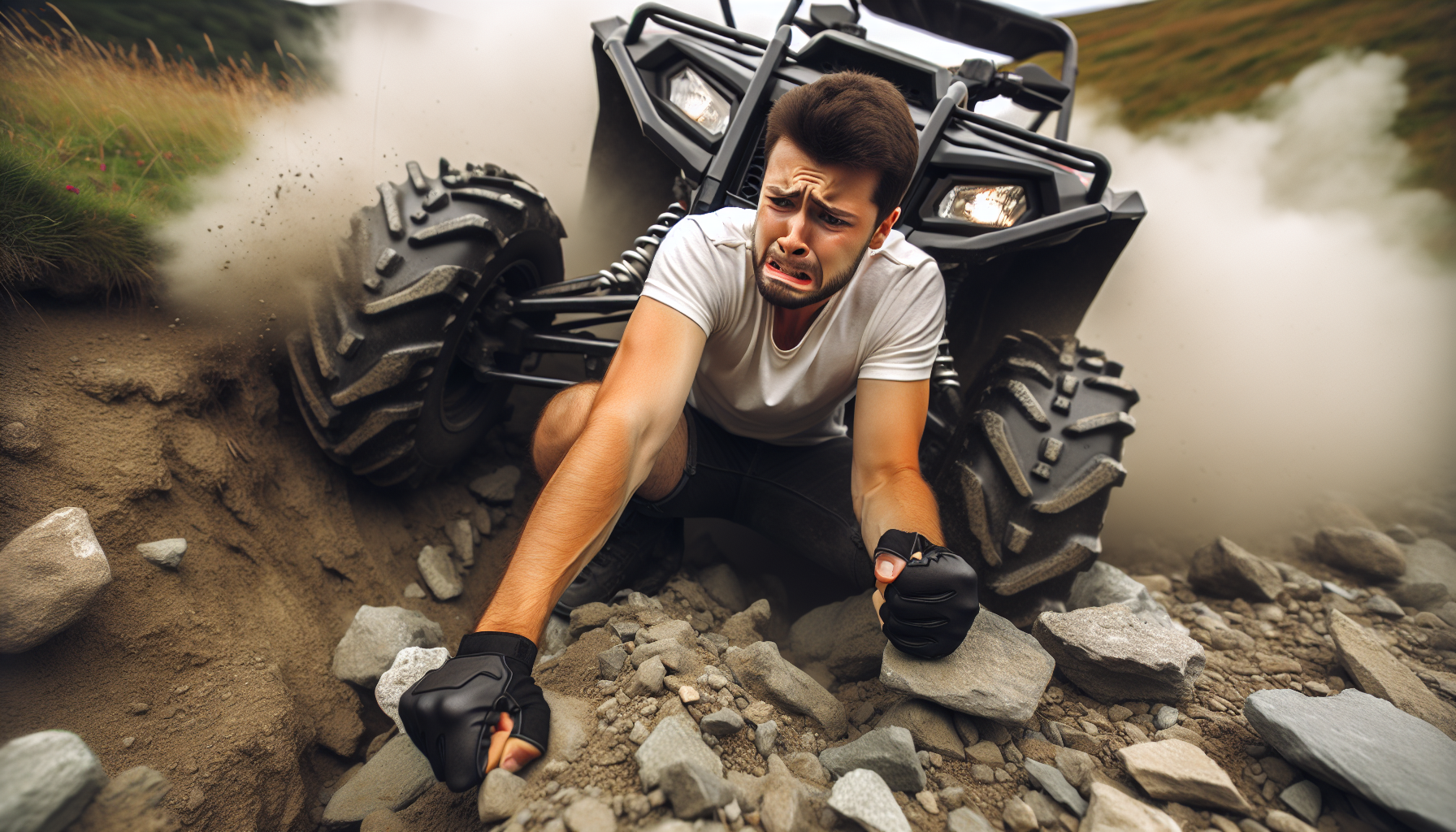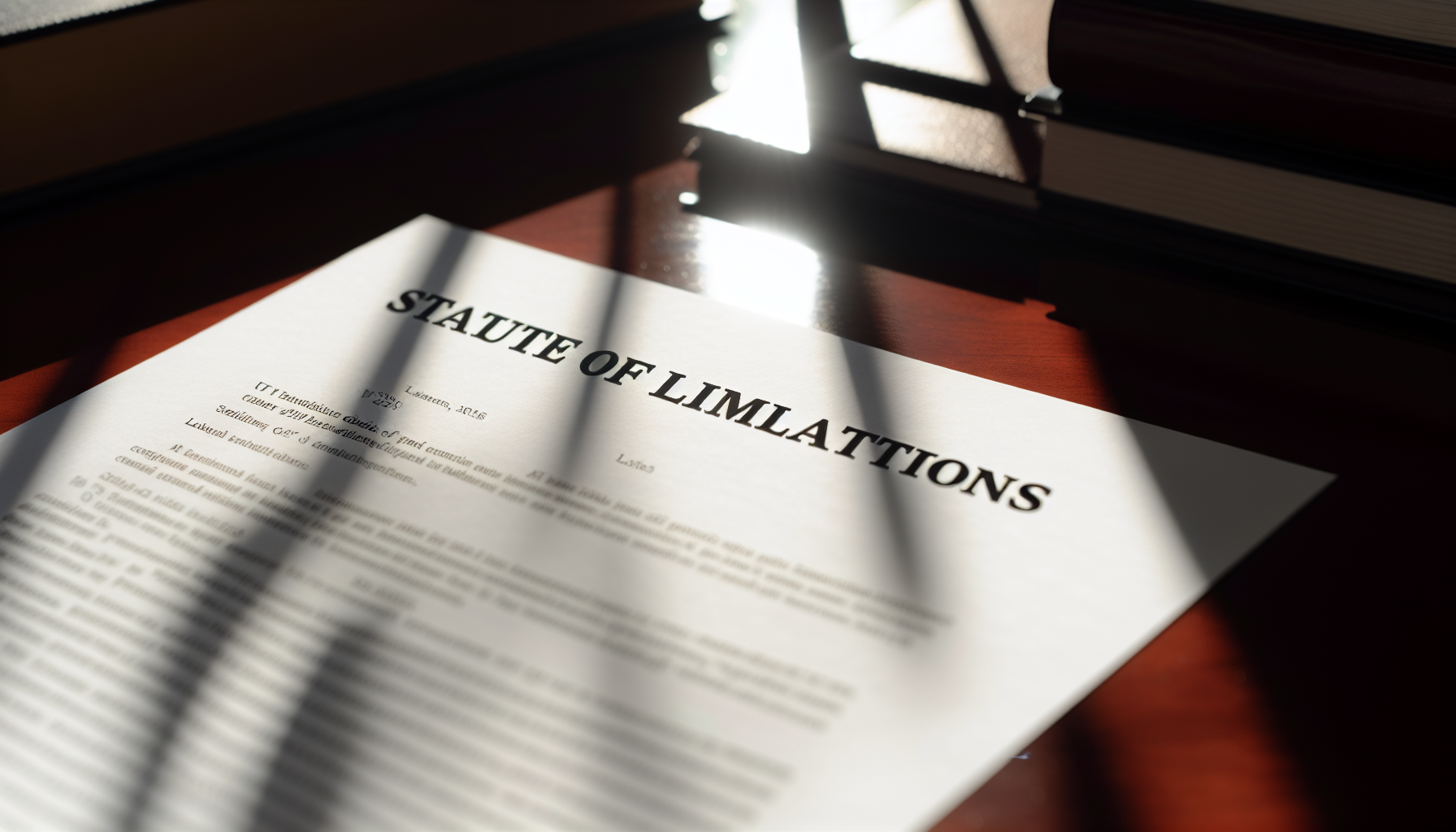Navigating the aftermath of an All-Terrain Vehicle (ATV) accident can be overwhelming. Besides the physical pain and emotional distress, victims often grapple with complex legal and insurance matters. This is where an experienced ATV accident attorney can make a world of difference. But, should you contact an attorney after an ATV accident? What role do they play? How can they assist in maximizing your compensation? Let’s unravel these questions and explore this crucial topic further.
Key Takeaways
- An experienced ATV accident attorney can help victims navigate the complex legal landscape, manage medical care, file lawsuits, compile evidence, and avoid costly mistakes to ensure fair compensation.
- Determining liability in ATV accidents can involve the driver, landowner, or manufacturer of the ATV, and lawyers play a crucial role in gathering evidence to support the claim, especially in product liability cases.
- Victims of ATV accidents may be eligible for various types of compensation, including economic damages for financial losses, non-economic damages for intangible losses, and punitive damages in cases of severe negligence or recklessness.
Why You Should Contact an ATV Accident Attorney

Victims of ATV accidents are often faced with a myriad of challenges, stretching from severe injuries to intricate insurance claims. An experienced ATV accident attorney can help you navigate these complexities, ensuring that your rights are protected and that you get the compensation you rightfully deserve. From managing your ongoing medical care to filing an ATV accident lawsuit and compiling evidence, ATV accident attorneys provide a range of services to their clients.
The proficiency of an attorney in dealing with ATV accident cases can significantly impact the outcome. They can assist you in avoiding costly mistakes and ensure that you receive the rightful compensation for your injuries. Therefore, it is advisable to seek legal counsel promptly after an ATV accident, particularly if it resulted from another party’s negligence or a mechanical failure, or if serious injuries were sustained.
Establishing Liability
Identifying who is at fault following an ATV accident is a complex process. The party responsible for the accident could be the driver, the landowner where the accident took place, or even the manufacturer of the ATV. In this regard, a lawyer is indispensable, gathering necessary evidence to support your claim, particularly in severe cases such as spinal cord injuries.
Product liability can also play a significant role in ATV accident cases. If the accident was caused or contributed to by a product defect, a claim may be brought against the manufacturer, distributor, or seller of the ATV. Navigating the complexities of product liability cases can be challenging, but a skilled accident lawyer can guide you through this process.
Navigating Insurance Claims
Insurance companies often employ tactics to expedite the settlement of ATV accident claims. They may offer a quick but reduced settlement, dissuade victims from seeking legal counsel, or document conversations with an aim to limit their liability. Navigating these tactics can be a daunting task for anyone recovering from an accident.
This is when the role of an ATV accident attorney, who is also a personal injury attorney, becomes crucial. An attorney can:
- Provide legal representation
- Negotiate with the insurance company to secure fair compensation
- Offer expert guidance to help you through the intricate process of filing and managing insurance claims
- Ensure that your rights are protected
Building a Strong Case
Constructing a robust case for compensation following an ATV accident necessitates careful and detailed scrutiny. An experienced attorney can:
- Collect critical evidence such as photographs, videos, witness statements, medical records, and accident reconstruction reports
- Ensure that all pertinent evidence is promptly collected and stored appropriately to bolster the case
- Help secure compensation for medical bills and other damages
The process of interviewing witnesses is also a key component in developing a robust case. Detailed accounts from witnesses can provide support for the sequence of events and liability, which are essential factors for the case, especially when dealing with ATV accident injuries. The attorney’s ability to synthesize the evidence and witness testimonies to convincingly sway the jury in your favor is crucial in securing a favorable judgment or settlement for your personal injury claim.
Common Causes of ATV Accidents and How They Affect Your Claim

ATV accidents can happen for a myriad of reasons. By understanding the most common causes of these accidents, you can better navigate your legal claim and potentially maximize your compensation. Inexperienced operators, defective equipment, and reckless behavior are some of the most common causes of ATV accidents.
Operators with a lack of experience might not have the required knowledge or training to operate the vehicle safely, which can lead to accidents. Mechanical failures, such as defective equipment like brake failures or steering malfunctions, can also significantly increase the risk of injury or damage. Reckless behaviors, such as speeding or driving under the influence, can likewise result in accidents due to a negligent disregard for safety.
Inexperienced Operators
Lack of experience or training can significantly contribute to ATV accidents. Inexperienced operators may engage in reckless behavior, be inattentive, or neglect safety protocols, thus increasing the likelihood of being held liable for damages and injuries. They may also select unsuitable ATVs, not wear proper gear, ride on inappropriate trails, misunderstand vehicle dynamics, or neglect maintenance, all of which contribute to accidents.
These mistakes not only lead to accidents but can also potentially impact liability and compensation in an ATV accident claim. If the operator’s lack of experience or training contributes to the accident, it can affect the determination of fault and the amount of compensation you may receive.
Defective Equipment
Faulty equipment can greatly contribute to the occurrence of ATV accidents. This could include faulty brakes, defective steering mechanisms, or lack of seat belts. Such defects can pose a substantial risk, potentially leading to high-speed collisions and severe injuries.
If an ATV accident was caused by defective equipment, it could result in a product liability claim against the manufacturer, distributor, or seller of the ATV. To make a successful claim, it is crucial to gather evidence and prove that the equipment was indeed defective and that this defect directly led to the occurrence of the accident.
Reckless Behavior
Reckless behavior is a major factor leading to ATV accidents. Factors such as:
- driving after consuming alcohol
- speeding
- climbing steep hills
- taking unnecessary risks
can lead to severe accidents. Many drivers are inclined to take greater risks and engage in reckless conduct, viewing it as an integral part of the activity’s excitement.
Reckless behavior can significantly impact compensation in an ATV accident claim. Demonstrating that the irresponsible actions of an individual directly caused the accident and the resulting injuries can lead to higher compensation due to the negligent party’s actions.
Types of Compensation Available in ATV Accident Cases

If you sustained injuries in an ATV accident due to another person’s negligence, you might qualify for compensation. It’s important to seek legal advice to understand your rights and options. Compensation in ATV accident cases can include economic damages, non-economic damages, and punitive damages, depending on the circumstances of the accident.
Economic damages cover your financial losses, including medical bills, lost income, and property damage. Non-economic damages, on the other hand, compensate for intangible losses, such as pain and suffering, emotional distress, and loss of enjoyment of life. In cases of extreme negligence or recklessness, punitive damages may also be awarded to deter similar behavior in the future.
Economic Damages
Economic damages cover financial losses incurred due to an ATV accident. This includes medical expenses, lost wages, and property damage. Medical expenses for economic damages claim may include costs for hospitalization, doctor visits, laboratory or imaging tests, and any follow-up care.
Lost income is another significant component of economic damages. This is calculated by estimating the injured person’s future loss of income, determining a present lump sum that will equal the future income they would have earned. In addition to these, the financial impact of property damage following an ATV accident can be assessed through ATV insurance coverage, which provides compensation for injuries and property damage resulting from ATV crashes.
Non-Economic Damages
While economic damages address quantifiable financial losses, non-economic damages compensate for non-quantifiable losses. These damages include pain and suffering, emotional distress, and loss of enjoyment of life. They consider the emotional and psychological impact of the accident on the victim’s life.
Non-economic damages are determined using methods such as the multiplier method, where a specific multiplier is applied to the sum of economic damages to estimate the compensation for intangible losses. Evidence like accident reconstruction reports and debris from the scene can demonstrate the severity of the accident and help assert non-economic damages.
Punitive Damages
Punitive damages are awarded in instances of extreme negligence or reckless behavior. They serve to punish the defendant for severe misconduct and deter others from replicating such behavior. The calculation of punitive damages is usually based on a ratio to the compensatory or actual damages, taking into account the severity of the misconduct and the intent behind the actions that resulted in the accident.
Instances of extreme negligence or recklessness that may lead to punitive damages include actions such as:
- operating the vehicle while under the influence
- engaging in reckless or aggressive high-speed driving
- any other behaviors demonstrating a conscious disregard for the safety of others.
Statute of Limitations and Its Impact on Your ATV Accident Claim

The statute of limitations defines the crucial period within which you must file a lawsuit. If you fail to file within this timeframe, you may lose the right to seek compensation entirely. It’s important to adhere to the filing deadline to protect your rights. The specific duration of the statute of limitations for personal injury claims resulting from ATV accidents varies across states.
In cases of confusion regarding the application of the statute of limitations, it is advisable to seek assistance from a qualified ATV accident attorney who can provide clarity and guidance on the matter. It’s crucial to consult an attorney to ensure you file within the appropriate time frame.
State-Specific Time Limits
Every state establishes its own statute of limitations for ATV accident claims. For instance, in Kentucky, it is 1 year or 2 years for auto accident claims, whereas in Louisiana, it is 1 year. These laws determine the time limit within which a person must file a lawsuit after an ATV accident.
Filing an ATV accident claim after the statute of limitations has expired may result in the claim being barred, leading to the injured party losing the ability to seek compensation for their injuries. Therefore, it’s crucial to be aware of the state-specific time limits to avoid missing the deadline.
Exceptions to the Statute of Limitations
Although the statute of limitations is generally strictly adhered to, certain exceptions may apply in specific cases. For example, in cases of ATV accidents involving minors, the statute of limitations generally commences when the child reaches the age of majority, which is 18 years old.
Some exceptions to the statute of limitations include:
- The discovery rule, which allows the commencement of the time limit when the injury was discovered or reasonably should have been discovered
- Instances where the injured person was mentally incapacitated
- The defendant is out of the jurisdiction
These exceptions may extend or toll the statute of limitations period.
How to Choose the Right ATV Accident Attorney

Selecting the appropriate ATV accident attorney is key to a successful claim. It is essential to look for a track record of success, clear communication and availability, and a contingency fee arrangement.
An attorney’s track record of success reflects their ability to effectively handle and win ATV accident cases, and help clients receive full compensation. Key factors that contribute to a successful ATV accident case include:
- Clear communication with the client regarding their injuries, the resulting impact, and the case’s progression
- Immediate availability to address any concerns or questions the client may have
- Comprehensive understanding of case details to build a strong claim for compensation
By considering these factors, you can ensure that you choose an attorney who is well-prepared to handle your ATV accident case and help you receive the compensation you deserve.
A contingency fee arrangement enables individuals to pursue legal action without having to pay upfront legal fees.
Track Record of Success
An attorney’s track record of success is a clear indicator of their ability to handle ATV accident cases effectively. Achieving positive results for clients, including securing deserved compensation, winning significant wrongful death suits, and obtaining high settlements, enhances the attorney’s credibility.
To evaluate an attorney’s track record, consider their experience with similar cases, their success rate in ATV accident cases, and ask for examples of successful outcomes they have achieved in the past. This can give you an idea of their capabilities and how they might handle your case.
Clear Communication and Availability
Clear communication and prompt availability are essential when collaborating with an ATV accident attorney. They facilitate:
- A comprehensive understanding of case details
- Effective communication with the client regarding their injuries, the resulting impact, and the case’s progression
- Ultimately contributing to a well-prepared claim for compensation.
An attorney should provide:
- A complimentary case evaluation
- Various efficient communication channels to address any legal inquiries you may have
- Regular updates on your case progress
- Ensuring you are kept consistently informed about any developments and future actions
This will ensure that you are kept well-informed throughout the duration of your case.
Contingency Fee Arrangement
A contingency fee arrangement is a contract in which an attorney agrees to accept a specified percentage of the recovery as payment for their services, instead of a fixed hourly fee. This means that:
- The attorney will only receive payment if they win the case or reach a settlement
- It reduces financial risk for the client
- It ensures that the attorney’s incentive is aligned with achieving the best possible outcome for their client.
In a contingency fee arrangement, an attorney typically takes around 33% to 40%. This arrangement provides a benefit to ATV accident victims by eliminating the need for them to pay any legal fees upfront. Attorneys only receive payment if the victim successfully obtains a monetary award through winning or settling their personal injury case.
Summary
In conclusion, seeking legal counsel after an ATV accident is crucial. An experienced ATV accident attorney can help establish liability, navigate insurance claims, and build a strong case for compensation. Understanding the common causes of ATV accidents and the types of compensation available can guide you through your legal journey. It’s also essential to be aware of the statute of limitations and how it impacts your claim. Lastly, choosing the right attorney—with a strong track record, clear communication, and a contingency fee arrangement—can greatly improve your chances of receiving the compensation you deserve.
Frequently Asked Questions
Why should I contact an ATV accident attorney after an accident?
You should contact an ATV accident attorney to help establish liability, navigate insurance claims, and build a strong case for compensation, as they provide a range of services to ensure fair contribution from negligent parties.
What are the common causes of ATV accidents?
Inexperienced operators, defective equipment, and reckless behavior are common causes of ATV accidents. It's important to address these factors to prevent accidents.
What types of compensation are available in ATV accident cases?
In ATV accident cases, victims can seek economic damages, non-economic damages, and punitive damages to recover their losses. These types of compensation cover a wide range of financial and non-financial losses resulting from the accident.
How does the statute of limitations impact my ATV accident claim?
The statute of limitations is a crucial timeframe for filing a lawsuit regarding an ATV accident claim. Failing to file within this timeframe could result in losing the right to seek compensation altogether.
What should I look for when choosing an ATV accident attorney?
When choosing an ATV accident attorney, look for a track record of success, clear communication, availability, and a contingency fee arrangement. This will ensure you have a reliable and effective legal representation.

